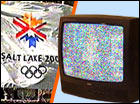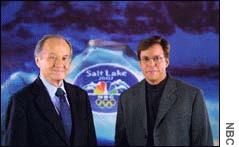|
NBC to delay Olympics on TV
|
 |
February 7, 2002: 9:04 a.m. ET
Even with games in Utah, network will use time delay for West Coast coverage.
By Staff Writer Chris Isidore
|
NEW YORK (CNN/Money) - Tape-delayed Olympic broadcasts - blamed for depressing U.S. viewer interest and NBC's advertising revenue during the 2000 Summer Olympics from Sydney, Australia - will be back for the 2002 Winter Games, even though the games will take place in Utah.
NBC will put its prime-time programming on a 2.5-hour tape delay for the 15 percent of the nation's television viewers in the Pacific Time Zone. In addition some key competitions that will be held during the day will also be held for rebroadcast in the evening in all time zones.
NBC, which is paying $545 million to broadcast the games in the United States, says this is being done to allow the most fans possible to watch the games.
"It was a very important issue to the West Coast affiliates," said Randy Falco, president of NBC, a unit of General Electric Co. (NBC: Research, Estimates) during a pre-Olympics press conference. "They felt that they knew their local audiences better and they lobbied us very, very hard."
Falco said that NBC did extensive research among West Coast viewers before making the decision.
"When you ask somebody if they'd rather have an event live or on tape, they're answer is, of course they'd rather have it live," Falco said. "When you explain to them that to have it live on the West Coast, it may be on at 5 o'clock, which means that they won't be available to view it, they'll go, 'Oh, well then I'd rather have it on tape.'"
Others question whether it's really the viewers' interest being served, or interest of the West Coast affiliates who make money from their early evening local news broadcast and wouldn't want to lose that programming for two weeks due to a potential 5 p.m. PT start.
"What Sydney told us, if they already know the results, less people watch," said Jeffrey Logsdon, media analyst with Gerard, Klauer, Mattison & Co . "I think it's a mistake. But maybe economically the affiliates will still make more money this way due to the local news."
NBC's West Coast primetime programming will run from 7:30 p.m. to 11 p.m., while the other three time zones will see coverage from 8 p.m. to 11:30 p.m. ET. Coverage on NBC's two cable stations - MSNBC and CNBC, which will carry 207 hours of the 375 hours of programming, will be shown simultaneously across all time zones.
| |

|
|
Jim McKay (left) and Bob Costas will anchor NBC's Winter Olympics coverage. | |
Falco doesn't have to look far to find critics of the decision. Dick Ebersol, chairman of NBC Sports, admits he fought the idea.
"It's one of the only decisions in my twelve-and-a-half years at NBC that I disagree with and obviously, I did not succeed," he said.
But even Ebersol didn't fight the idea of putting some major daytime events, such as the top alpine sports, on tape delay across the country, although he pointed out that 75 percent of NBC's coverage will be broadcast live, at least in the three time zones.
"To support the advertisers who've underwritten these extraordinary costs...we're in the business of getting them the largest possible audience," Ebersol said. He said the audience is 200 to 300 percent larger in primetime than in the afternoon.
The use of tape delay broadcast of a daytime event has been common in past Olympics. In fact one of the best rated U.S. broadcasts of any Olympic event - the 1980 U.S. hockey team victory over the heavily-favored Soviet Union teams, was shown by ABC on tape delay because it had been held earlier in the day.
Still NBC won't be following the same course for other sporting events it will carry during the course of the Olympics - such as the Daytona 500, which airs at noon eastern time and 9 a.m. PT on Feb. 17, or the National Basketball Association All-Star game, which airs 5 p.m. ET, and 2 p.m. PT, Feb. 10. NBC said it never considered running those events on tape delay.
"It's not fair to really compare this to a weekend sporting event that is traditionally carried live across all the time zones," said Falco. "People are available to see it at different times. This is 17 straight nights, many of them weekday nights, where people will not be available at 5 p.m. to watch the games." 
|
|
|
|
|
|

|

